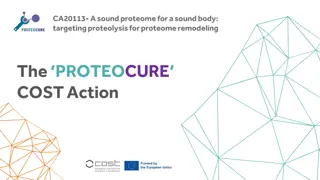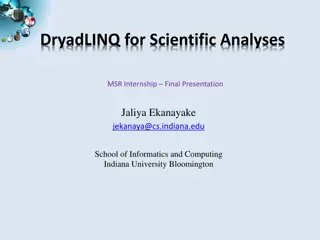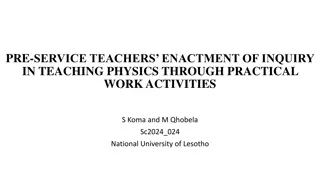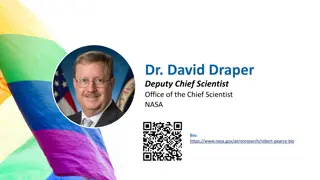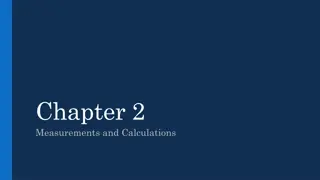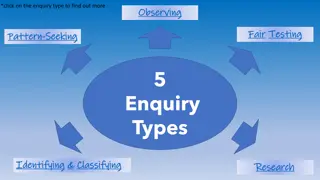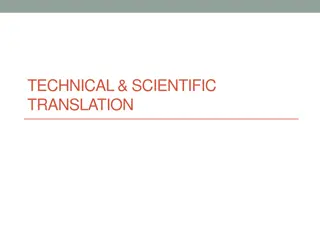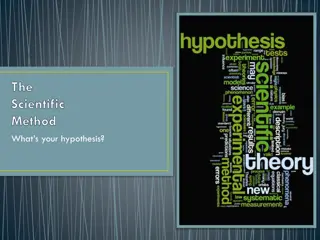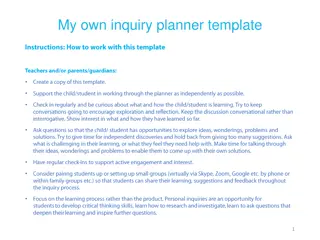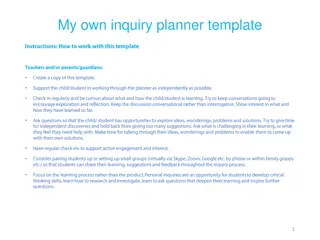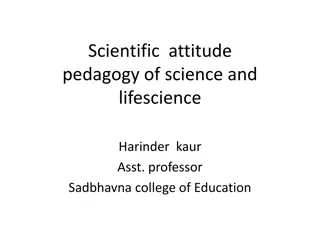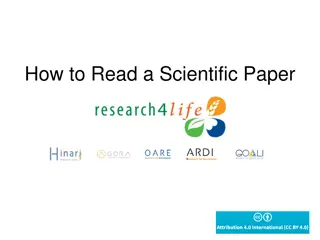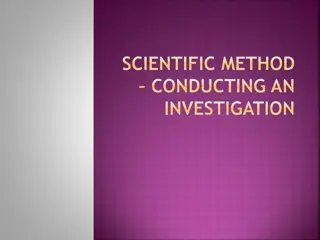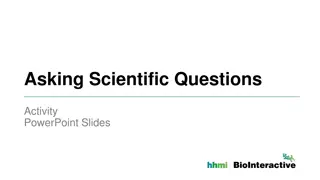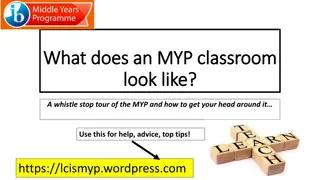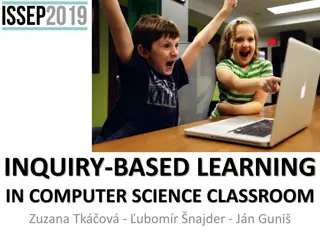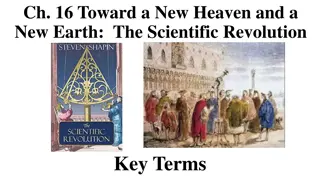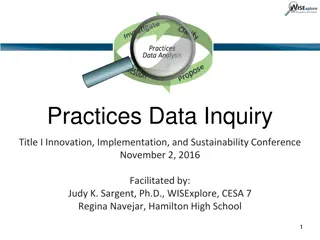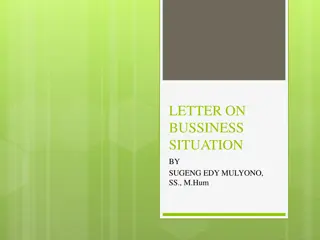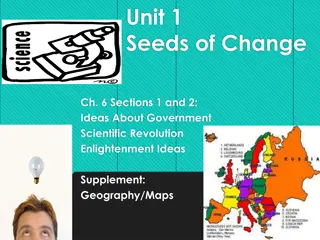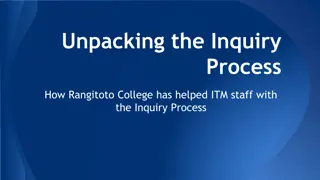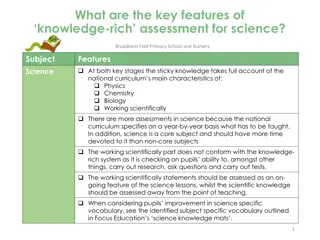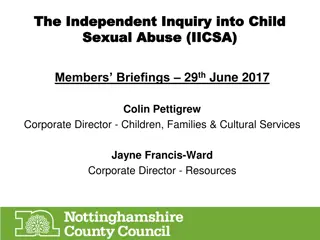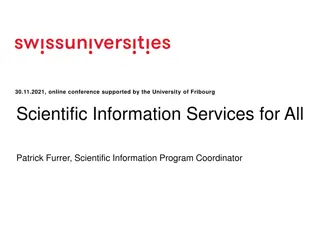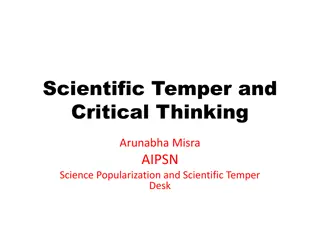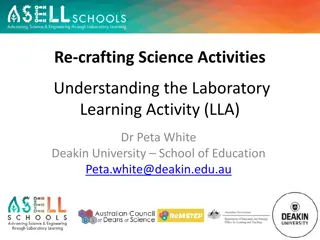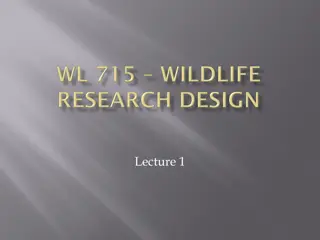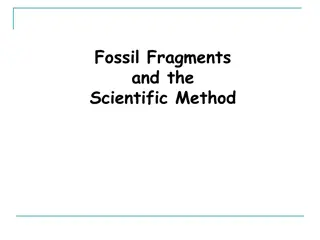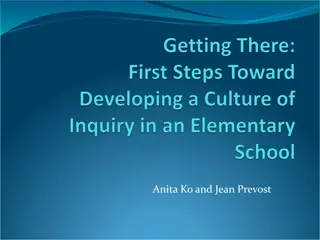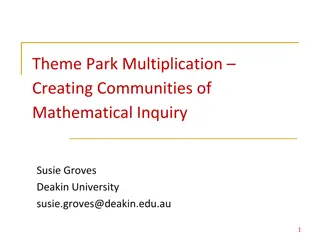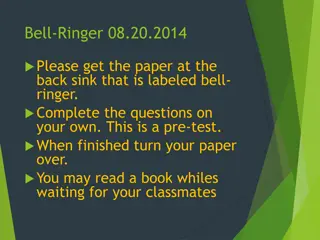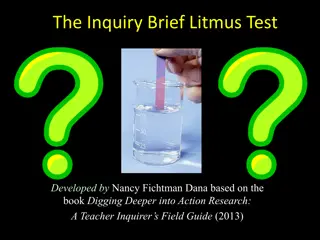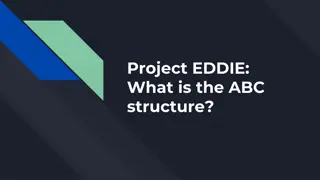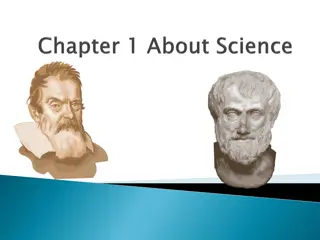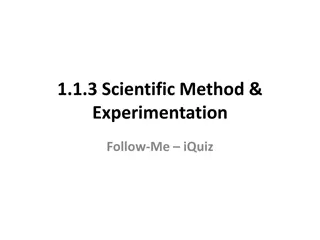Enhancing Scientific Literacy in Early Years Play-Based Learning
This PhD research proposal explores scientific literacy among children in play-based learning, focusing on everyday concepts and their application to scientific understanding. The study aims to implement Vygotsky's sociocultural theory to enhance children's scientific literacy through Vision 1 and V
7 views • 19 slides
Exploring the PROTEOCURE COST Action: Targeting Proteolysis for Proteome Remodeling
The PROTEOCURE COST Action focuses on targeting proteolysis for proteome remodeling, aiming to enhance Europe's scientific and technological capacity through collaboration across various fields and career stages. Participating in this initiative offers financial support, scientific networking, and c
0 views • 17 slides
Understanding Climate Change through Scientific Inquiry
Explore the role of science in addressing climate change, identifying scientific questions, discussing different disciplines involved, and analyzing the strength and limitations of scientific methods. Engage in activities to understand how scientific questions are formulated and categorized for inve
2 views • 22 slides
The Chemistry of Coatings. Scientific Inquiry Project
Delve into the world of coatings and polymers through scientific inquiry projects, understanding the steps of the scientific method and engineering design. Learn about polymers, epoxies, and their various applications in coatings, adhesives, industrial tooling, electronics, and more.
0 views • 25 slides
Evaluation of DryadLINQ for Scientific Analyses
DryadLINQ was evaluated for scientific analyses in the context of developing and comparing various scientific applications with similar MapReduce implementations. The study aimed to assess the usability of DryadLINQ, create scientific applications utilizing it, and analyze their performance against
0 views • 20 slides
Understanding Pre-Service Teachers' Inquiry Teaching in Physics
Lesotho's curriculum emphasizes hands-on activities and inquiry teaching strategies in Physics. However, challenges such as resource limitations affect practical work involvement. This study explores the levels of inquiry implemented by Physics pre-service teachers (PSTs) during their teaching pract
0 views • 10 slides
Overview of NASA's Office of the Chief Scientist and Deputy Chief Scientist Dr. David Draper
The Office of the Chief Scientist (OCS) at NASA plays a vital role in advising, advocating, and representing the agency in various scientific matters. Dr. David Draper serves as the Deputy Chief Scientist. The OCS leads initiatives related to scientific integrity, research security, citizen science,
2 views • 11 slides
Understanding the Scientific Method in Measurements and Calculations
Explore the scientific method in detail, including observing, collecting data, formulating hypotheses, testing hypotheses, and formulating theories with practical examples. Understand the importance of experimentation and how it leads to the development of scientific theories. Engage in activities t
6 views • 43 slides
Exploring Scientific Inquiry Methods for Primary School Students
Observation, fair testing, and research are essential methods for primary school students to learn scientific inquiry. Observation questions help in identifying and measuring events over time, fair test questions facilitate comparisons to understand cause and effect relationships, and research allow
0 views • 12 slides
Understanding Scientific Translation: A Vital Tool for Advancing Knowledge
Scientific translation is a specialized practice that involves accurately translating complex terms in fields such as science and technology to facilitate global knowledge exchange and advancement. It requires precision, fidelity to source material, and a deep understanding of technical terminology
0 views • 60 slides
Understanding the Scientific Method: A Logical Framework for Problem-Solving
The Scientific Method is a systematic approach used to solve problems and seek answers in a logical step-by-step manner. By following key steps such as stating the problem, researching, forming a hypothesis, testing, analyzing data, and drawing conclusions, this method helps clarify uncertainties an
1 views • 18 slides
Exploring Skills and Attributes for Personal Inquiry Planning
Discover the skills and learner profile attributes you currently utilize in your personal inquiry process, and reflect on areas for improvement to enhance your planning effectiveness. Engage with insightful image slides depicting key aspects of inquiry planning and self-assessment.
1 views • 9 slides
Exploring My Inquiry Skills through Visual Templates
Dive into a visual journey of self-reflection with images depicting inquiry planning templates. Reflect on your current skill usage, identify areas for improvement, and explore learner profile attributes to enhance your personal inquiry process.
1 views • 9 slides
Understanding Scientific Attitude and Pedagogy of Science
Scientific attitude involves open-mindedness, curiosity, rationality, and a desire for accurate knowledge. It includes characteristics such as critical thinking, respect for diverse viewpoints, and a reliance on verified information. Developing a scientific attitude involves studying superstitions,
1 views • 6 slides
Guide to Reading Scientific Papers
Understanding how to read a scientific paper is crucial for researchers and students alike. This guide covers the types of scientific papers, organization of a paper, and the key steps to properly read and comprehend complex scientific information. It explains the different sections of a paper, such
0 views • 20 slides
Understanding the Scientific Method: A Comprehensive Guide
Exploring the scientific method and principles of scientific investigation, this guide covers the mindset of a scientist, steps in the scientific method, and key components like formulating questions, conducting research, creating hypotheses, performing experiments, and analyzing results. It emphasi
1 views • 21 slides
Unveiling the Essence of Scientific Inquiry
Delve into the essence of scientific questioning, exploring the driving force behind scientists' day-to-day work, the elements that define science, and the significance of cause and effect in elucidating natural phenomena. Unravel the world of scientific jargon with engaging activities aimed at fost
0 views • 19 slides
Understanding the MYP Classroom: A Comprehensive Overview
Explore the key components of an MYP classroom, including the integration of AtL skills, progression through inquiry questions, and alignment of summative tasks with the statement of inquiry. Discover how students engage with concepts, global contexts, and self-assessment, fostering deep inquiry and
0 views • 17 slides
**Exploring Inquiry-Based Learning in Computer Science Education**
Inquiry-based learning (IBL) in computer science classrooms focuses on fostering communication, collaboration, decision-making, and problem-solving skills among students. The approach involves students constructing knowledge through independent, active activities based on real-world experiences. How
0 views • 18 slides
Explore the Scientific Revolution
The Scientific Revolution marked a shift from the medieval worldview to a secular, rational, and materialistic perspective. Key terms such as geocentric and heliocentric conceptions, Cartesian dualism, rationalism, and the scientific method played pivotal roles in shaping this transformative period.
7 views • 10 slides
Innovation & Sustainability Conference: Data Inquiry for School Improvement
Explore how student data findings drive inquiry into practices, learn to identify and collect data as practice indicators, understand the Practices Data Inquiry process, and reflect on a Wisconsin school's journey from data analysis to practice analysis.
0 views • 47 slides
Understanding Business Inquiry Letters - Types and Examples
Business inquiry letters play a crucial role in establishing communication and gathering information between businesses. This article explores the types of inquiry letters, such as import, domestic, export, and personal, with detailed examples for each type. Learn how to effectively communicate your
0 views • 11 slides
Seeds of Change: Government, Science, and Enlightenment in European History
Explore the evolution of government, scientific revolution, and Enlightenment ideas in Europe through monarchies, the Scientific Revolution's impact on society, and the Age of Reason. Uncover the shift towards questioning authority and the pursuit of logic and reason. Delve into the significance of
0 views • 22 slides
Enhancing Professional Development Through the Inquiry Process at Rangitoto College
Explore how Rangitoto College has supported its ITM staff through innovative practices, mentorship programs, and a culture of inquiry. From unpacking the inquiry process to effective pedagogy, discover the collaborative efforts that promote continuous professional growth and development.
0 views • 35 slides
Key Features of Knowledge-Rich Assessment for Science at Broadbent Fold Primary School
Sticky knowledge in science assessment at Broadbent Fold Primary School encompasses Physics, Chemistry, Biology, and Working Scientifically. Assessments are detailed due to the structured national curriculum, with a focus on specific scientific vocabulary and practical applications. The ongoing asse
0 views • 20 slides
Independent Inquiry into Child Sexual Abuse (IICSA) Investigations Overview
The Independent Inquiry into Child Sexual Abuse (IICSA) is a statutory inquiry established in March 2015 covering England and Wales, led by Professor Alexis Jay. It has launched 13 investigations into various institutions including cases of child exploitation, institutional responses, and accountabi
0 views • 14 slides
Scientific Services for All - Enhancing Scientific Information and Services
This online conference, supported by the University of Fribourg, focuses on providing scientific information and services for all. Led by Patrick Furrer, the Scientific Information Program Coordinator, the event delves into creating a network of services, developing a coordination structure, and sho
0 views • 12 slides
Exploration of Scientific Temper and Critical Thinking in Ancient India
Delve into historical accounts showcasing the pursuit of scientific inquiry, challenging societal norms, and embracing critical thinking in ancient India through incidents involving Madhusudan Gupta, David Hare, and the revolutionary work of dissection. Explore the intersection of tradition and prog
0 views • 34 slides
Fusion Science Department Enabling Research Projects 2021-2023
The Fusion Science Department Enabling Research Projects for 2021-2023 focus on developing novel fusion-relevant scientific and technological ideas. These projects, led by Principal Investigators, are distinct from main work packages and involve scientific planning, team collaboration, and resource
0 views • 11 slides
Enhancing Science Education Through Laboratory Learning Activities
Explore the importance of laboratory learning activities (LLAs) in science education, focusing on contemporary science representation, inquiry skills, and conceptual learning. Discover the benefits of inquiry-based learning, teaching science inquiry skills, and incorporating more inquiry-based learn
0 views • 22 slides
Understanding the Queensland Parliament's Inquiry on Vilification and Hate Crimes
The Queensland Parliament's Legal Affairs & Safety Committee is leading an inquiry to investigate hate crimes and vilification in Queensland, examining the effectiveness of current laws and encouraging submissions and stories to help address these issues. The inquiry was prompted by the rise in publ
0 views • 27 slides
Understanding the Scientific Method: Key Concepts and Steps
Exploring the essence of science through definitions, types of science, and the scientific method. Emphasizes the importance of asking well-defined questions, developing testable hypotheses, setting up reproducible experiments, and making predictions based on established knowledge. An insightful jou
0 views • 27 slides
Understanding the Scientific Method Through Fossil Fragments
Exploring the scientific method through the study of fossil fragments involves careful observation, sketching, and inference-making to understand past organisms and habitats. The steps of the scientific method, such as asking questions, conducting experiments, and drawing conclusions, are integral t
0 views • 32 slides
Developing a Culture of Inquiry in Elementary School: A Journey Overview
Explore the journey of developing a culture of inquiry in an elementary school through three inquiry cycles. Starting with the introduction of Inquiry Based Learning, sustaining interest, learning outcomes, and evolving questions are discussed alongside examples of inquiry learning at various school
0 views • 26 slides
Exploring Mathematical Inquiry in Theme Park Multiplication Communities
Delve into the world of mathematical inquiry through structured problem-solving lessons, careful task selection, and creating a classroom community of inquiry. Witness students' unique solution strategies and engage in discussions on multiplication concepts, all aimed at fostering a deeper understan
0 views • 13 slides
Understanding the Scientific Method: Pre-Test and Daily Agenda
Explore the process of science with a pre-test on the scientific method, followed by a detailed daily agenda covering activities like bell-ringers, reviews, and experimental design. Understand the nature of science, scientific reasoning, and the importance of variables, groups, and constants in inve
0 views • 51 slides
Explore the Inquiry Brief Litmus Test for Effective Action Research
Delve into the Inquiry Brief Litmus Test developed by Nancy Fichtman Dana for robust action research planning. Understand the key components of an inquiry brief and how it guides teams in their exploration of school learning capacity. Utilize the series of questions in the litmus test to refine your
0 views • 30 slides
Understanding the ABC Structure and Pedagogical Approach in Science Education
Explore the ABC structure of inquiry-based learning – from Prescriptive to Open Inquiry, and understand the rationale behind this pedagogical approach in providing authentic disciplinary experiences to students. Overcome challenges in managing unknowns in open inquiry and discover the key elements
0 views • 12 slides
Evolution of Scientific Thought and the Scientific Method
Explore the evolution of scientific theories and methodologies through the works of influential figures like Aristotle, Copernicus, Galileo Galilei, and Francis Bacon. From the geocentric beliefs of Aristotle to the heliocentric model proposed by Copernicus, witness the shift in paradigms and the em
0 views • 14 slides
Understanding the Scientific Method and Experimentation
This interactive quiz explores the scientific method and experimentation process, including formulating hypotheses, conducting experiments, and analyzing results. It highlights key concepts such as hypothesis development, testing, and publishing results. Test your knowledge and deepen your understan
1 views • 50 slides

